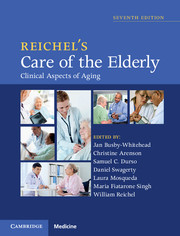Book contents
- Reichel’s Care of the Elderly
- Reichel’s Care of the Elderly
- Copyright page
- Contents
- Editorial Advisory Committee
- Contributors
- Acknowledgments
- Section I General approach to the care of the elderly
- Section II Geriatric syndromes
- Section III Care of the elderly by organ system
- Chapter 12 Diagnosis and management of heart disease in the elderly
- Chapter 13 Hypertension in the elderly
- Chapter 14 Peripheral artery disease in the elderly
- Chapter 15 Neurologic problems in the elderly
- Chapter 16 Prevention, diagnosis, and management of stroke and TIA in the elderly
- Chapter 17 Movement disorders in the elderly
- Chapter 18 Sleep disorders in the elderly*
- Chapter 19 Clinical geropsychiatry
- Chapter 20 Unhealthy substance use in older adults
- Chapter 21 Pulmonary issues in the elderly
- Chapter 22 Gastrointestinal disease in the elderly
- Chapter 23 Serious infections in the elderly
- Chapter 24 Human immunodeficiency virus in the elderly
- Chapter 25 Renal disorders in the elderly
- Chapter 26 Urological issues in older adults
- Chapter 27 Urinary incontinence and fecal incontinence
- Chapter 28 Gynecologic issues in the elderly
- Chapter 29 Endocrine disorders in the elderly
- Chapter 30 Diabetes mellitus in the older adult
- Chapter 31 Lipid management in older patients
- Chapter 32 Osteoporosis and other metabolic bone disorders
- Chapter 33 Common rheumatologic diseases in the elderly
- Chapter 34 Musculoskeletal injuries in the elderly
- Chapter 35 Dermatologic conditions in the elderly
- Chapter 36 Pressure ulcers
- Chapter 37 Anemia and other hematological problems in the elderly
- Chapter 38 Cancer in the elderly
- Chapter 39 Eye problems of the aged
- Chapter 40 Geriatric otolaryngology
- Chapter 41 Dental care for the elderly patient
- Chapter 42 Foot health in the elderly
- Section IV Principles of care for the elderly
- Index
- Plate Section (PDF Only)
- References
Chapter 22 - Gastrointestinal disease in the elderly
from Section III - Care of the elderly by organ system
Published online by Cambridge University Press: 05 June 2016
- Reichel’s Care of the Elderly
- Reichel’s Care of the Elderly
- Copyright page
- Contents
- Editorial Advisory Committee
- Contributors
- Acknowledgments
- Section I General approach to the care of the elderly
- Section II Geriatric syndromes
- Section III Care of the elderly by organ system
- Chapter 12 Diagnosis and management of heart disease in the elderly
- Chapter 13 Hypertension in the elderly
- Chapter 14 Peripheral artery disease in the elderly
- Chapter 15 Neurologic problems in the elderly
- Chapter 16 Prevention, diagnosis, and management of stroke and TIA in the elderly
- Chapter 17 Movement disorders in the elderly
- Chapter 18 Sleep disorders in the elderly*
- Chapter 19 Clinical geropsychiatry
- Chapter 20 Unhealthy substance use in older adults
- Chapter 21 Pulmonary issues in the elderly
- Chapter 22 Gastrointestinal disease in the elderly
- Chapter 23 Serious infections in the elderly
- Chapter 24 Human immunodeficiency virus in the elderly
- Chapter 25 Renal disorders in the elderly
- Chapter 26 Urological issues in older adults
- Chapter 27 Urinary incontinence and fecal incontinence
- Chapter 28 Gynecologic issues in the elderly
- Chapter 29 Endocrine disorders in the elderly
- Chapter 30 Diabetes mellitus in the older adult
- Chapter 31 Lipid management in older patients
- Chapter 32 Osteoporosis and other metabolic bone disorders
- Chapter 33 Common rheumatologic diseases in the elderly
- Chapter 34 Musculoskeletal injuries in the elderly
- Chapter 35 Dermatologic conditions in the elderly
- Chapter 36 Pressure ulcers
- Chapter 37 Anemia and other hematological problems in the elderly
- Chapter 38 Cancer in the elderly
- Chapter 39 Eye problems of the aged
- Chapter 40 Geriatric otolaryngology
- Chapter 41 Dental care for the elderly patient
- Chapter 42 Foot health in the elderly
- Section IV Principles of care for the elderly
- Index
- Plate Section (PDF Only)
- References
Summary
- Type
- Chapter
- Information
- Reichel's Care of the ElderlyClinical Aspects of Aging, pp. 311 - 330Publisher: Cambridge University PressPrint publication year: 2016

